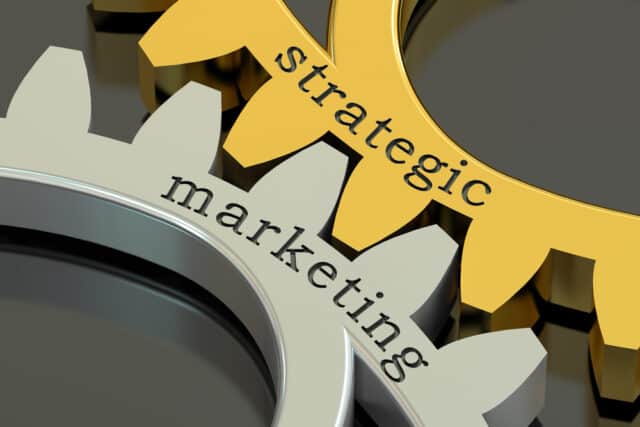Are you really aware of the Importance of Strategic Marketing?

Businesses cannot ignore the importance of strategic marketing. A complete marketing plan will incorporate all aspects of your company. It includes thorough research, evaluation, planning, implementation, and creation of products, services, etc. It will also focus on pricing strategy, marketing budgets, specific campaigns, promotions, distribution channels, and revenue. It should also incorporate your long-term plan and your company’s goals and aspirations. Finally, it should set out what you want to achieve next and how you intend to reach those goals.
Marketing Strategy vs. Strategic Marketing
A marketing strategy is a collection of activities that will lead to achieving your objectives. It should include all aspects of marketing activities, including advertising, social media, public relations, customer service, sales, target audience, etc. The scope of your marketing operations is known as strategic marketing. It comprises a thorough examination of your current business condition as well as a forecast of how you believe your company will develop in the future.
What happens when Strategic Marketing is overlooked?
If you don’t have a strategic marketing plan, it will be challenging to know where you should focus your efforts. In such a way, you may miss out on new opportunities and fail to achieve your goals. For example, if you don’t know what products you want to promote, you lose out on the competition and may not get profits. Similarly, if you don’t know the right price, resources and don’t have a business strategy, your sales professionals may also be not able to communicate with them effectively.
What is Strategic Marketing?

The term “strategic marketing” refers to marketing that aims to build customer loyalty over time. If you want to establish a relationship with your target customer, you need to give them more than just a quick sale. This could include advertising campaigns, social media marketing, email marketing, public relations, SEO, etc. The goal of strategic marketing planning is to impact your target audience that will last.
The essential factors of strategic marketing management
Strategic marketing involves the below-mentioned elements:
Market analysis
Identify your target market by understanding who they are, what problems they face, and where they spend their money. Before you can start thinking about how to attract your potential consumers, you must first figure out who they are.
Target audience
Define your ideal customer and understand what motivates them to choose your products and services. Many businesses use segmentation techniques to define different groups of customers.
Channel selection
Select the best channel(s) for communication purposes. This includes choosing the media such as TV, radio, print, online, etc., and the timing (when to launch) for the communication.
Marketing mix
Decide which elements of your offer will work best for the marketing mix. These might include price, packaging, location, promotion, delivery methods, quality control, brand image, design, etc. Make sure your customer knows the advantages of your service or product.
The Importance of Strategic Marketing Plans
Beyond just a compilation of ideas, strategic marketing planning is an approach. They’re made to make sure your company keeps growing. Without a clear strategy, you could end up wasting valuable resources. Strategic marketing helps provide you with a framework for measuring your progress. You’ll be responsible for tracking your improvement over time due to this. You can change your marketing strategy based on this knowledge. In addition, a well-thought-out strategic marketing plan helps you avoid common mistakes. For example, if you focus too much on one aspect of your business without considering the rest, you may neglect important areas of your business. A good strategic marketing process should include:
a) Your vision statement: Your vision statement should be easy to understand, concise, and relevant. It should be a simple statement that clearly communicates the general value proposition of your business. It can also be an inspiring phrase that piques people’s interest in your company.
b) Your mission statement: Your mission statement is significant in determining the overall direction of the business. It informs the rest of the world about who you are and what you believe in. This can be both your starting and endpoint and a guiding light on getting there.
c) Your target market: Determine the type of buyer you’re targeting and their desired experience. You’ll be able to develop the ideal business strategy if you have a solid grasp of your perfect consumer.
d) Your product line: The most significant factor in your progress is your product line. If you want to market a product effectively, you need to first know what will work and what won’t. A strategic marketing plan is a road map that leads to the location you want your product line to be.
e) Your pricing structure: Prices and product offerings convey value to customers. Understand your customers and how they perceive value in your product or service. The price you offer must have a method and rationale to it. This is done by creating a pricing structure that allows the customer to understand and justify the value of your service.
f) Your distribution channels: Distribution channels, also known as distribution media, are the means by which you may get your goods and/or services in front of potential clients. When choosing a channel, optimize for low cost and high efficiency in reaching those buyers.
g) Your branding: Company branding goes far beyond simple trademarks and logos. Branding is paramount to any business’ success. But what should your business brand look like? What elements should it include, and how do you develop it? Strategic marketing plans can help you find the answers.
h) Your advertising campaigns: Marketing is a skill, and as with any skill, practice makes you a master. This is true for marketing too. You need to gain experience before holding your head high in an advertising campaign. However, many don’t take the importance of advertising campaigns seriously.
i) Your website design: One of the most effective marketing tools in your hands is most likely your company website. Every business, regardless of how large or little, has a website. And as the number of individuals utilizing the internet grows every day, their significance cannot be neglected. Having a page that converts is really the first step in creating a fully-branded marketing plan. While developing your website, you should keep the end goal in mind. For example, is your company designing a new site for brand awareness? Or is it for lead generation? There are various factors to be acknowledged when trying to decide on what your game plan should be.
j) Your social media presence: Everyone is using social media, with countless numbers of business pages available. At least having a presence on social media is required in today’s society. But how many users will see your posts and care about them? What kind of material will garner the most attention? Will you share an article or blog on social media? Answering these questions is essential, and the answers can be found in the strategic marketing plans.
k) Your content creation: The core of your online marketing approach is content. Anybody can write a blog post, or article, shoot a video, or record an episode of their podcast. Your blog is the first location where potential buyers may learn about your business. “Not only is your brand at stake but so are opportunities to gain new customers.” But without a strategy to back it up, your content creation efforts could become a waste. Content creation involves far more than simply typing on a keyboard.
l) Your customer service policies: You may keep losing a customer if you provide poor customer service. The benefit is that a solution is there. Brand loyalty has been proven to be based on consumer experience. The consumer experience can be improved through strategic marketing. Through customer data and relationship management, your business can stay ahead of your competition competitors, as well as show that your company cares.
m) Your employee training programs: Employee training is getting increasingly popular than ever. Suppose you plan to develop an employee training process for your marketing team. It is vital to identify which section of your business you intend to target. Another factor is your products should have unique selling points that differentiate them from competitors.
Conclusion
Marketing strategy helps to grow your business. Make sure that you are doing everything in a scheduled phase to ensure that your company grows. You may probably waste significant resources if you do not have a clear strategic marketing plan.
Subscribe to our Newsletter
Sign up to receive email updates on new product announcements, exclusive sales and marketing content, special offers on email validation plans, and more.
We send curated content as per your preference and do not indulge in spam!
What would you like to know about
We’re committed to your privacy. TuxMailer uses the information you provide to us to contact you about our relevant content, products, and services. You may unsubscribe from these communications at any time. For more information, check out our privacy policy.



